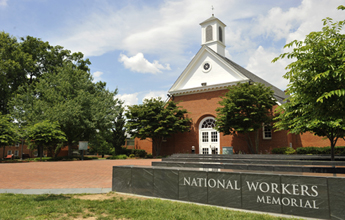Workers Memorial Day Remembers Victims, Highlights Job Safety
Posted on May 8, 2012 8:49 am

Linemen working on high-voltage electric lines, tree trimmers working at high elevations, wiremen working in confined spaces. Supplying electricity can be a dangerous business, which is why the IBEW makes safety and health a high priority.
Devastating recent workplace tragedies at nonunion sites, including the explosion at Massey Energy’s Upper Big Branch mine in West Virginia that killed 29 miners and the BP Deepwater Horizon disaster that killed 11 and caused massive environmental and economic turmoil, prove that on-the-job accidents are an ever-present threat. A study published in the Journal of Occupational and Environmental Medicine says:
Union [worksites] distinguish themselves by better training, more stable employment, a workplace where regular safety meetings are held. . . .They also had better knowledge of safety practices and felt they had more control over their own safety.
In 1970, Congress passed the Occupational Safety and Health Act, promising every worker the right to a safe job. Although workplace fatalities and injuries in the U.S. have significantly declined since the law took effect, in 2010, 4,500 workers lost their lives on the job and another 50,000 died from occupational diseases, says the AFL-CIO. That’s 149 workers each day.
To honor those who have lost their lives as a result of job-related illness or injury, countries around the world designate April 28 of each year Workers Memorial Day. With the slogan “Remember the dead – Fight for the living,” the day combines a tribute to those who have suffered in the past with a renewed commitment to keeping workers safe today and in the future.
Says IBEW Safety and Health Director Jim Tomaseski:
Great progress has been made to strengthen workplace safety in industries employing IBEW members – but our work is far from finished. Too many IBEW members continue to suffer from on-the-job injuries. The IBEW will remain at the forefront of this fight, pushing for stronger job safety laws and regulations to ensure that our members experience a safe and healthy workplace.
It is now as important as ever that labor take a strong stand to keep workers safe. An October 2012 report issued by the nonprofit group Public Citizen says that the Occupational Safety and Health Administration has produced regulations in the past decade at a far slower rate than ever before:
“When it comes to health and safety protections for workers, there has been a regulatory drought. While OSHA was once able to develop a rule in less than a year, the process now exceeds six years on average.”
The report goes on:
More than 100,000 serious injuries, more than 10,000 cases of illness and hundreds of fatalities could have been prevented had the protections not been delayed.
The National Labor College in Silver Spring, Md. hosted a Workers Memorial Day event on Friday, April 27. The college houses the National Workers Memorial, its granite benches and engraved bricks acting as permanent reminders of the human toll caused by unsafe working conditions.
Responding to the past year’s attacks on public workers across the country, the event included a symposium focused on first responders, public employees and the health and safety of workers and their communities. Panelist Joseph McCartin, associate professor of history at Georgetown University, says:
Overwhelmingly our first responders are public workers. They work for our governments, local, state and federal. In recent years government workers have become a favored target of some callous opportunists in our currently poisonous political environment. So it is crucial on this Workers Memorial Day that we dedicate ourselves to the task of not only honoring our dead and our wounded, not only remembering those who have suffered in our service, but of speaking out for those who endure stress and hardship every day in order to make us safe.
In addition to the memorial, the campus is the home of the Center for Excellence in Health and Safety, including the college’s Rail Workers Hazmat Training program and the National Resource Center for OSHA training.
Says IBEW International President Edwin D. Hill:
Workers have and always will be the best advocates for safety on the job. We need to demand that workers have a say in job safety rules and ensure that there are strong penalties in place for companies committing safety violations.
via Workers Memorial Day Remembers Victims, Highlights Job Safety.
